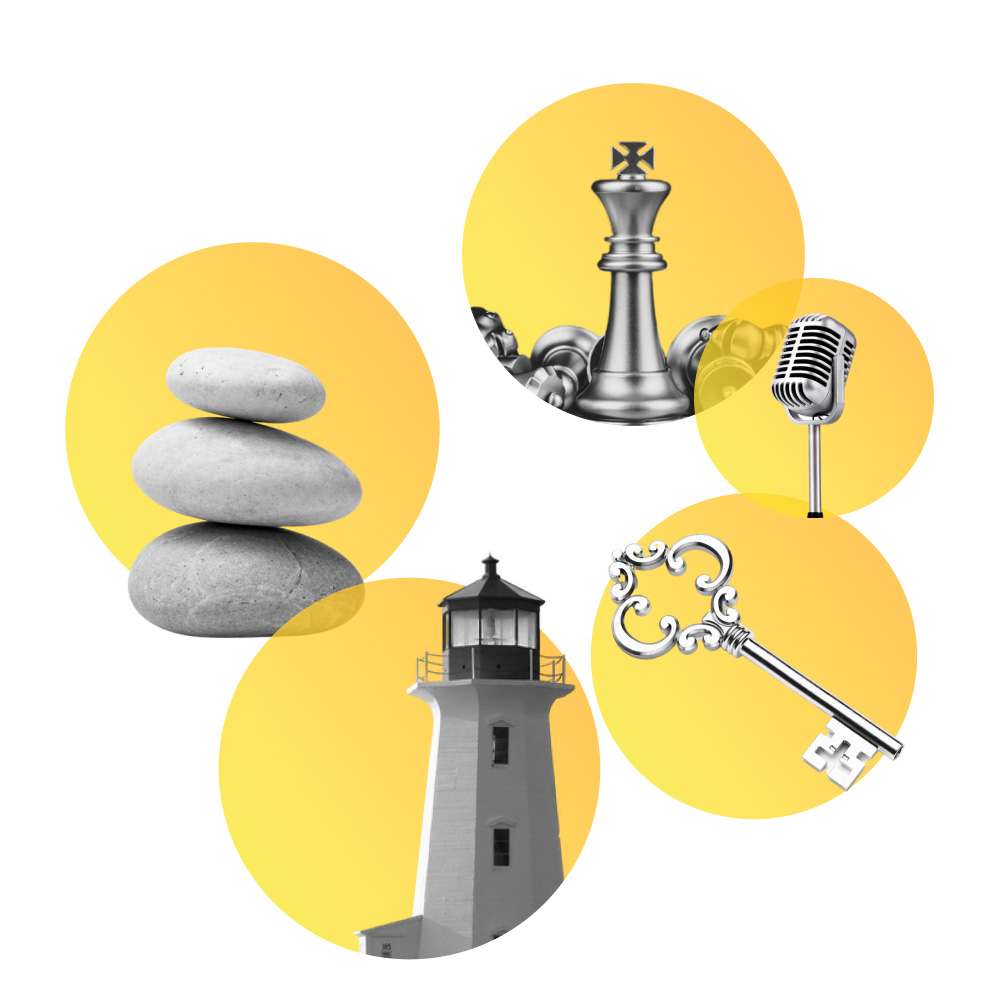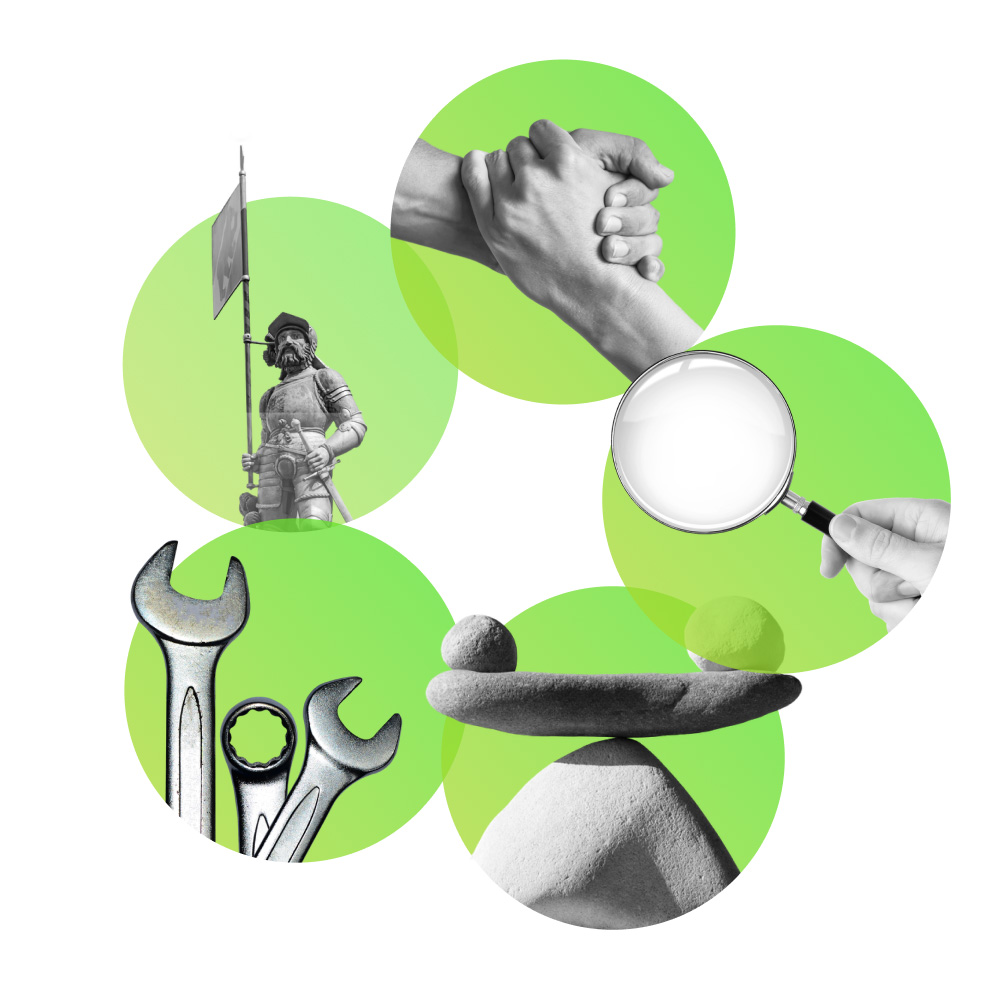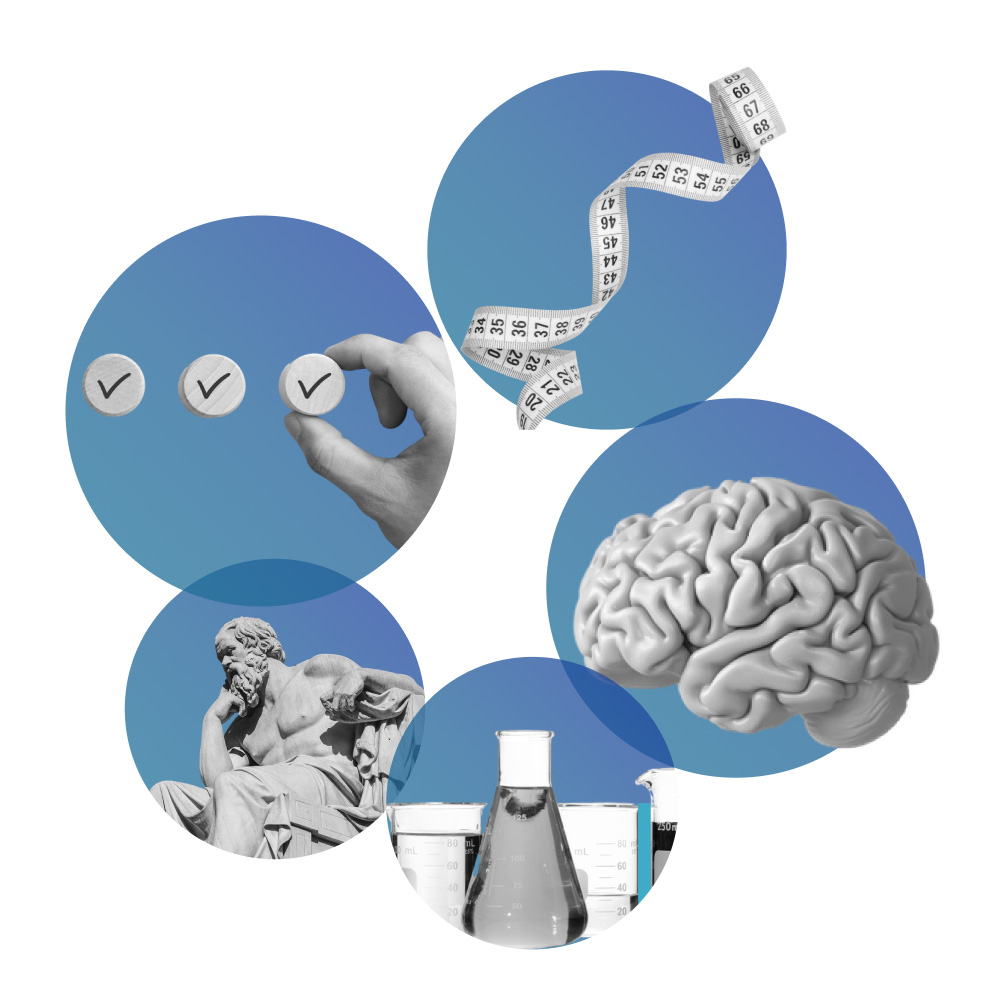
I'm sure you've noticed that there are all sorts of different personality types But what exactly are personality types? What personality types are there? Why are personality types important and how can knowledge about the different types be useful in the everyday life? So many questions and a lot of exciting answers. Here we go!
Personality is formed by the "totality of the personal (characteristic, individual) qualities of a person" (source: Duden online). It influences how you behave in certain situations, which emotions you feel and which attitude towards life guides you. It consists of your temperament and your character traits and continues to evolve throughout your life.
Your personality forms the basis for interpersonal relationships. The exciting thing: Every person has their own unique personality. No matter how similar the characteristics of two people are, their personalities are never completely the same, no matter how much they resemble each other. Although each person has an individual personality, there are certain basic principles that can be observed across the board. These basic principles are called personality types.
People like to categorize. This could also be called Pigeonhole thinking categorization. And even if it may sound superficial, categorization is a useful tool for better understanding how we live together in society. Getting to know the different personality types can therefore also help you in your everyday life: It expands your awareness of your own Behaviors and those of other people.
This is especially practical for partnerships, friendships and all interpersonal relationships. When you assign a personality type to your counterpart, you can assess more easily how he will behave in certain situations. You also know how to deal with your counterpart, what makes him happy and what makes him sad. All in all, you will get a better understanding of the feelings of the other. And step by step your relationships happier, more profound and fulfilling.
As you already know, personalities are as varied and complex as people themselves. The DISC Theory dates back to 1982 and was first developed by the American psychologist William Moulton Marston.
If you would like to learn more about the DISC model and the associated Personality Test be sure to check out our magazine article "DISC - What can you learn from the personality test". In addition, Tobias Beck, international speaker, consultant and lecturer, has compared the four personality types in an entertaining and instructive way with four animal human types. You can see the comparison here:Tobias Beck - The 4 animal human types.
If you are in a hurry, you are well positioned with our overview that follows. Here we explain all the combinations that result from the four behavioral dimensions. We distinguish a total of 20 personality types, which can be divided into four families, i.e. four behavioural dimensions: the red (dominant), the yellow (influencing), the green (steady) and the blue (cautious) family.
In the following we will go into more detail. Be curious - maybe you'll even find out which personality type you embody and which personality types you come into contact with most often in your private and professional environment? We hope you enjoy reading!
Red and therefore dominant personality types are characterized by their strong Self-confidence and their high degree of determination. They are born leaders and love competition. When a dominant type sets its mind on something, it is best not to stand in its way. If the person wants to achieve something, nothing and no one can keep him/her from doing it. In addition, the dominant type communicates briefly and promptly. He is quite dominant - and proud of it.

The pioneer is a real doer: he takes advantage of opportunities presented to him, is very happy to deal with difficult and challenging situations, and gives instructions. In order to keep all the balls he is juggling in the air at the same time, he is always setting priorities for himself. The Pioneer rewards and punishes in equal measure, responding quickly while being decisive. This personality type has a need for management and control of events. He wants to satisfy his desire for individuality and determination, and works best when his environment is constantly changing.
Trailblazers love to stand out from the group. This suits them more than being just one of many. They stand for changes, are the driving force and spur others on. In doing so, they set a fast pace. The pioneer prefers to work without instructions, independently and freely. He uses his creative ideas for charitable purposes and has the need to perform his tasks well and to develop individually.
The pace setter is a true hero: he transforms frustration so that problems are cleared up, presents his personal opinion convincingly and discusses with the greatest passion. Pacesetters like to choose meaningful activities and recognize differences. They have a deep desire for independence and courage. Working on tasks in their entirety - from conception to completion - is absolutely in the blood of this personality type.
Ask questions, take practical action, find solutions. That is probably the best way to describe the inventor. He prepares himself extensively, keeping a distance from other people. The inventor is a loner and happy when he can work for himself. His life is characterized by constant ideas. When implementing them, he prefers to be undisturbed and needs a sufficient amount of time.
The mediator - as his name suggests - is a genius at mediating between other people. He is fascinated by new methods, testing them and selecting the best ideas to finally build them into an existing system. Mediators are very reliable people and produce immediate results. Furthermore, they love to work in different ways, which ultimately all lead to the intial goal that was set.
Influencing personality types are extroverted and love to be the center of attention. They like to stand out, prefer to be loud rather than quiet, and try to have as much fun in life as possible. Thanks to their open and humorous nature, they get into conversation with others quickly and socialize easily. They are extremely good at motivating others, but can be a bit chaotic. They are less in-depth, but are always up for a good time.

The entertainer is the clown among the personality types. This personality type always wants to be the center of attention and fights for the attention of those around it. The Entertainer establishes rapport with others without difficulty while relying on others to support him. He can engage in a wide variety of activities, has a need for acceptance, Satisfaction and affiliation, and works most effectively when not controlled in the process.
The persuader is confident and uses the motivation of others. Through his considered choice of words and positive attitude he creates attention for himself. As a result, he often receives support from others and tries to repeat success early. He does not like obscure situations, has a need for self-assertion and at the same time the desire for special leadership. The persuader loves interpersonal contact with other personality types, because this fulfills his desire for self-assertion.
Harmony is incredibly important to the harmonizer - as the name already says. He consciously establishes contact with people, in order to create a pleasant and friendly environment to create. He builds bridges between people, shares with them and always includes them in decisions. Harmonizers have a need to help: They are good at putting themselves in the shoes of others and support them as best they can. The most important values of the Harmonizer are Acceptance, loyalty and trust.
The strategist meets the needs of those around him. He has challenges and problems always in view and prepares himself for difficult situations. He moves things forward, likes to improvise when necessary, and can still provide plausible reasons when he spontaneously changes direction. At the same time, the strategist is always open to new ideas and works best when he can contribute his own ideas and skills and also convince other personality types.
Coordinators have a great strength: Communication. In addition to talking, these personality types are also excellent listeners, ask questions, negotiate and compromise. The coordinator is a self-confident person with good spirits and uses not only his feelings, but equally also factsto back up his personal convictions. He also likes to swim against the tide.
Steady personality types place great value on pleasing everyone. They are caring and loyal, love consistency and feel most comfortable in a constant environment. Being humble and loyal, they have an incredibly big heart and take loving care of friends, relatives and colleagues. They sometimes have to be a little careful not to take advantage of their good nature.

Stabilizers are patient contemporaries who fulfill their duties and are loyal while expecting the same from their fellow men. This type openly expresses his convictions and defends its Values. He can be enthusiastic about nature and finds pleasure in a beautiful environment. The stabilizer finds success in his work through specialization, has a need for cooperation and satisfaction and can develop particularly well if he has sufficient time to proceed in an orderly and strategic manner.
A critical listener who looks for weaknesses in others and contrarian positions: This is the specialist. He is eager, vigilant, and very careful. He earns respect through his actions, his knowledge and the expertisethat he acquires in a particular area. He likes evaluable results and also likes to ask unpleasant questions.
Helpers are people who are good listeners and give others exactly what they need. In doing so, they spare no effort. The helper is organized, open to new ideas, recognizes others and their achievements, and is always honest. Standing up for fairness and equality to care, which also contributes to his need for Loyalty and self-sacrifice fits.
Diligence, recognition, security: The preservationist compromises, wants his responsibility shared with others and prefers to let others decide. He thinks things through carefully before promising anything to those around him, while setting a steady pace. At work, the Preserver unfolds best when given a detailed job description.
Harmonious relationships, traditions and rituals: this is the basis of the practitioner. He supports his fellow men in planning and organization, is knowledgeable and always friendly. If one disappoints a practitioner, he often reacts judgmentally. Basically he attaches great importance to an atmosphere of cooperation, honesty and kindness.
Cautious personality types are true order, planning and quality geniuses. They love logical thinking and work precisely, like a perfectionist. Their heart beats for numbers, data and facts. Basically, they prefer to work on things rather than with people. They draw new energy from calmness - one of the many reasons why they like to complete their tasks on their own.

The Perfectionist - competes with things rather than people, has the urge to please others all the time, and compromises when necessary. He believes that hard work always pays off in the end, and is looking for areas of responsibility where he can work in a focused way on his own. People with the Perfectionist personality type bring order into chaos, have the need for self-discipline and conscientiousness and prefer to work with a clearly structured approach.
Experimenters weigh up all aspects of a problem very carefully. This sometimes leads them to think too long about the right decision. Only through experience can they make better decisions. Experimenters like to simplify processes and give precise explanations. As skeptical personality types, they only show empathy towards people close to them and prefer to be alone. If you would like to know what empathy looks like in everyday life, you can find some examples here Empathy examples in everyday life. They also like to check how useful new ideas are.
Evaluators are tactful people with predictable behavior that are always friendly. They develop analytical approaches, proceed systematically and expect a reward in return for their accurate work, for example in the form of a salary increase. The evaluator checks his ideas for a real implementation and has the need for correctness and quality.
The critical thinker is firmly convinced that he can prevent problems and uses defensive strategies to avoid difficult situations. He is rational, reasonable and has a strong awareness of what is right and what is wrong. Having gathered the relevant facts, he takes calculable risks and at the same time has a desire for order. The critical thinker can stand hostilities just as little as unclear conditions.
Designers bring credibility to chaotic situations. They solve complex challenges successfully and have no problem taking on unpleasant and difficult tasks from others. The designer prefers to work alone and small talk is not exactly in his nature. He combines his intuition with analysis and thus fulfils his need for professional fulfilment.
So now you know what different dimensions of behavior there are and what combinations in the form of types they can take. But which Personality type is the most common? Is it even possible to make such a general statement?
Yes, you can! A study found that the S type - that is, the steady personality type that wears the color green - is the most common worldwide. A full 32 percent of people are this type. However, it's important to note that this is only worldwide - each country may differ. The different cultures are certainly an important factor why some DISC types are more common than others.
And what about the other side? If there is one personality type that is most common, is there also a type that is encountered less often? The red, i.e. dominant DISC type is found in just 9 percent of the population worldwide.
This is significantly less in contrast to the other types. Here there are hardly any differences between the countries. For almost all countries, the pioneer is rather rare. However, the situation is different in Myanmar: There, the red type shares the last place equally with the S-type, i.e. the stabilizer, which, after all, performs best in a global comparison.
Now you are probably asking yourself: Which DISC type am I? You can find out quite simply with a Personality Test find out. At Greator, we have used the DISC personality types as the basis for our free test.The four dimensions of behavior can be identified in just three minutes.
To do this, you answer 16 questions about your personality. What applies most and least to you? Based on your answers, we can determine which of the four behavioral dimensions you are and send you the result by email a few minutes after your test. Best of all, the test is free of charge!

In the course of our lives we change again and again. We constantly experience new things, collect experiences, meet decisions and ideally also work on ourselves and our personality over and over. How does this affect the personality types? Does it have any influence at all and can your DISC type also change completely?
Basically, it can be said that for most people the personality type remains constant over time. Of course, it can happen that smaller changes in the results of your DISC personality test ...you're going to have to surrender. Because as described above, you change again and again during your life and learn constantly. However, major differences rarely occur, because basically we remain who we are at the core.
You already know a lot about the DISC personality types. For example, that basically four different behavioral dimensions are distinguished: the red, yellow, green and blue family. These can be further subdivided into 20 personality typesto describe each person as appropriately as possible.
Today there are many different personality tests. They all have one thing in common: they want to tell you what type you are and thus help you to live in harmony with your personality. The free Greator personality test is based on the DISC types. But how accurate is the test? Can it really tell us which personality you have?
Some approaches of renowned scientists as well as psychotherapists were involved in the creation of the DISC personality test involved. In addition, various statistical studies have validated the DISC model and its ability to obtain accurate results. The test is now even used in human resources and achieves impressive success rates. These facts show how valid the DISC test is!
Would you now also like to find out your behavioral dimension and learn more about your personality? Then take our free personality test now and find out whether you belong to the red, yellow, green or blue DISG family! We wish you a lot of fun and many new impulses.



